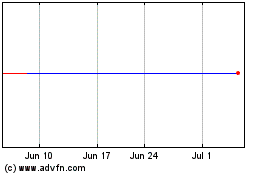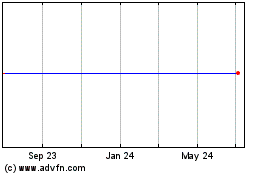By Robert McMillan and Lisa Beilfuss
It's been a bumpy road but Dell Inc.'s blockbuster acquisition
of EMC Inc. is on track to reach its next major milestone, a vote
by EMC shareholders, within the next few months.
The deal, now valued at $60 billion, $7 billion less than it
originally was worth, would have Dell Inc. take over storage
company EMC by October. EMC chief Joe Tucci on Wednesday reaffirmed
that all systems are go.
"We expect the transaction to happen on the original terms and
within the originally announced time frame," Mr. Tucci said during
a conference call with analysts. "Integration planning has
accelerated..., the leadership team has been established and we've
received the vast majority of antitrust approvals required."
Financial analysts also believe that the deal will be approved.
"Given the way stocks are going right now, there's a good chance
the deal will go through," said Abhey Lamba, managing director with
Mizuho Securities USA Inc.
Dell's parent company, Denali Holding Inc., is completing a
proxy filing with the Securities and Exchange Commission, and the
shareholder vote is expected six weeks after that. That pushes the
vote back to June. Dell and EMC had hoped the shareholder vote
would take place by early May.
A series of missteps since the deal was announced have hammered
the share price of VMware, a publicly traded EMC subsidiary in
which the parent owns an 81% stake. The problems lowered the payout
that EMC shareholders could expect if the deal went through. In
October, when the acquisition was announced, Dell's offer,
partially pegged to the price of VMware stock, was worth more than
$33 per share. On Wednesday, it had fallen to nearly $30 a share
due to the slide in VMware's value, while EMC shares traded just
above $26
Shares of VMware have dropped 25% since the deal was announced,
but they were up 13% on Wednesday on news of a stock buyback, as
well as quarterly results that suggested the merger plan hadn't
hurt the company's financial prospects as much as some financial
analysts had feared.
Dell's big bet comes at a time when incumbent technology giants
are struggling. On Tuesday, Intel said it would lay off 12,000
employees, about 11% of its workforce. IBM on Monday reported its
16th-straight quarterly decline in revenue.
And the former Hewlett-Packard Co. has spun off its printer and
personal computer businesses in a divestiture that stands in
contrast to Dell's bid to consolidate diverse IT products and
services under one umbrella.
EMC's revenues have missed analyst expectations for six straight
quarters as its core businesses have shrunk. Sales in 2015 of its
high-end storage gear dropped 14% while its midrange business was
down 18%, according to the industry research firm Gartner Inc. The
two businesses accounted for $3.9 billion in revenue. The company's
flash storage business offset some of those losses, growing by 122%
to $1 billion.
"The spending environment continues to be challenging," said EMC
Chief Financial Officer Denis Cashman, "as customers focus more on
transformative IT projects while also minimizing transactional
spends."
Tying up with privately held Dell will give EMC breathing room
to focus on longer-term opportunities, Mr. Tucci said.
"There's an advantage to being private," said Patrick Moorhead,
president of Moor Insights & Strategy. He pointed to Dell's
rising market share and ability to operate out of the spotlight,
disrupting competition without having to telegraph moves and
without the quarterly scrutiny of investors and Wall Street
analysts.
"What Dell has shown is they can handle the complexity where HP
said they couldn't," Mr. Moorhead said. Whereas HP determined that
its businesses were better off divided between two entities, the
combination of EMC and Dell "makes sense," he said.
HP said there's a difference. Dell and EMC are looking to "get
larger, lever up their balance sheet, and double-down on mostly
legacy technology," an HP Enterprise spokeswoman said via email. HP
by contrast is looking to focus on new technology, while
"de-levering the balance sheet," she said.
EMC reported first-quarter profit of $268 million, or 14 cents a
share, up from $252 million, or 13 cents, a year earlier. Excluding
the expense of stock-based compensation and restructuring, among
other items, earnings per share were 31 cents, flat from the
year-ago period.
Revenue slipped 2.5% to $5.48 billion. Analysts projected 33
cents in adjusted per-share profit on $5.63 billion in sales,
according to Thomson Reuters.
EMC attributed the disappointing results to an excess of
unfulfilled orders at the end of the quarter. Unshipped
storage-product orders totaled roughly $75 million due to the
timing of bookings within the quarter, according to Mr.
Cashman.
Sales in the VMware business rose a better-than-expected 5% from
a year earlier, and the company backed its earlier sales guidance
for the year. In EMC's Pivotal segment, which offers cloud and big
data software by subscription, revenue soared 56% from last year's
quarter.
Those gains were offset by a decline in the company's
information infrastructure business, its biggest, where sales
declined 5.9%.
Write to Robert McMillan at Robert.Mcmillan@wsj.com and Lisa
Beilfuss at lisa.beilfuss@wsj.com
(END) Dow Jones Newswires
April 20, 2016 17:59 ET (21:59 GMT)
Copyright (c) 2016 Dow Jones & Company, Inc.
Global X Funds (NYSE:EMC)
Historical Stock Chart
From Mar 2024 to Apr 2024

Global X Funds (NYSE:EMC)
Historical Stock Chart
From Apr 2023 to Apr 2024
